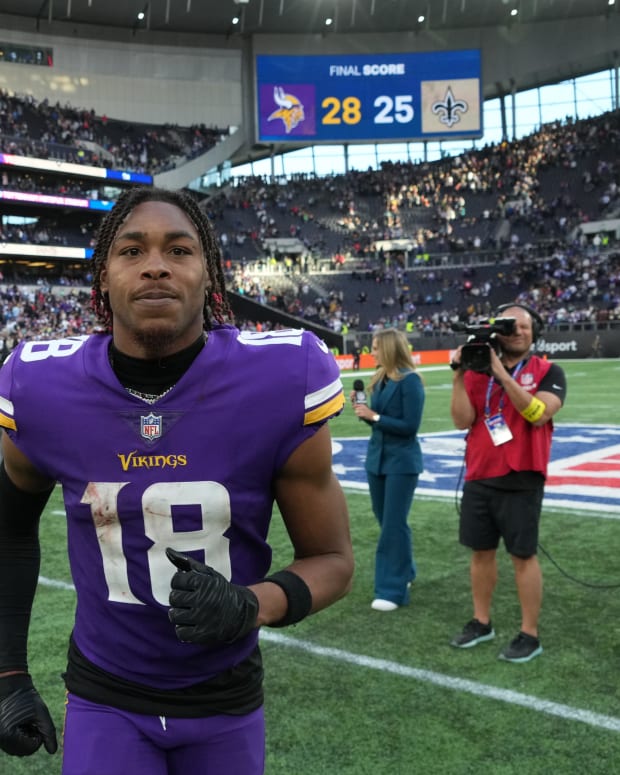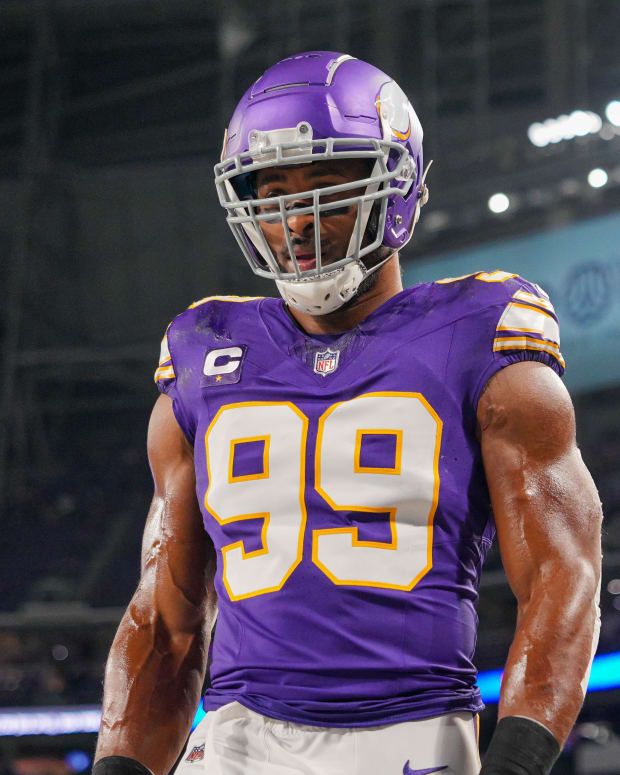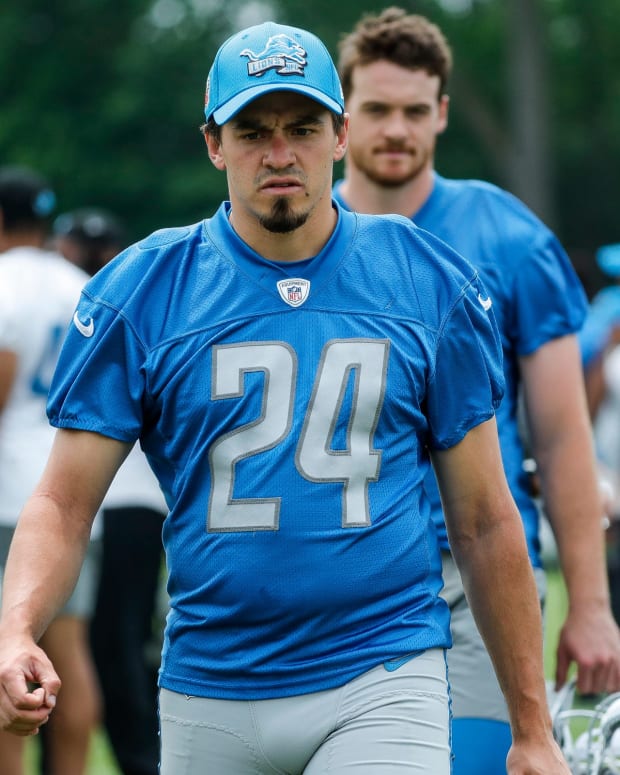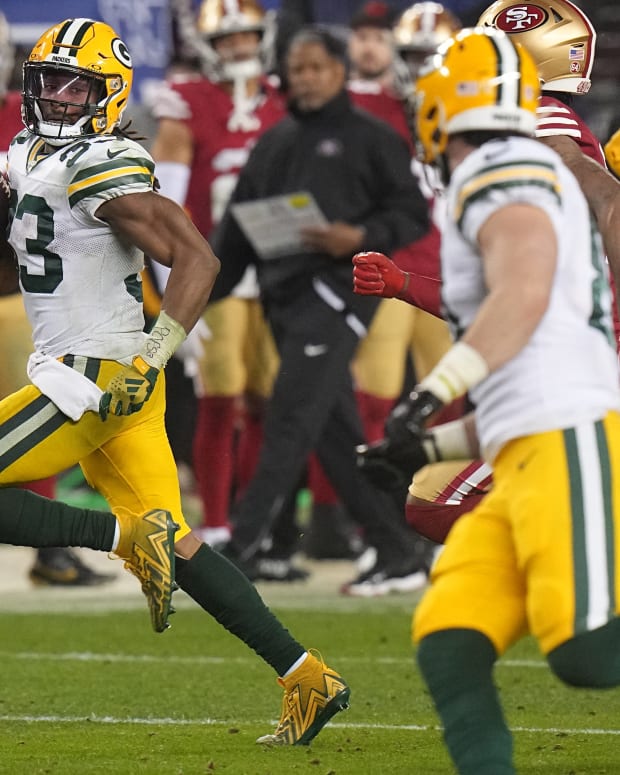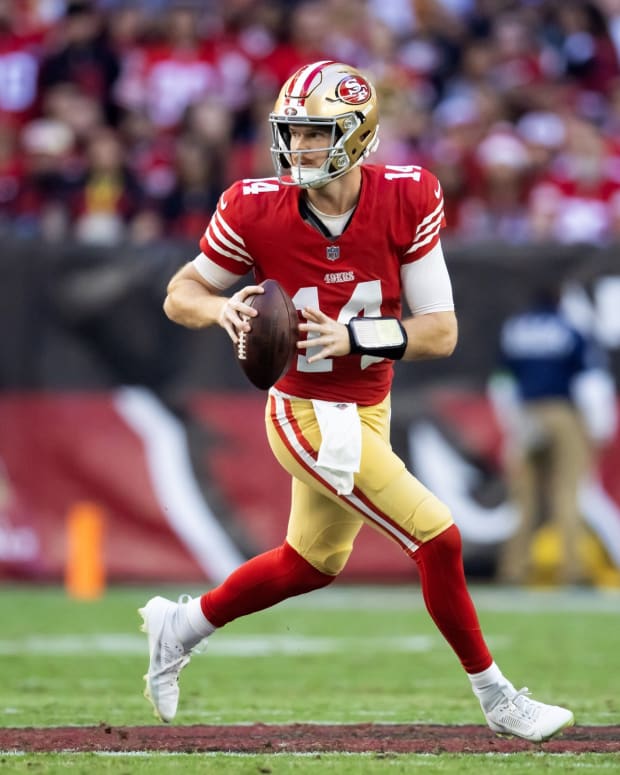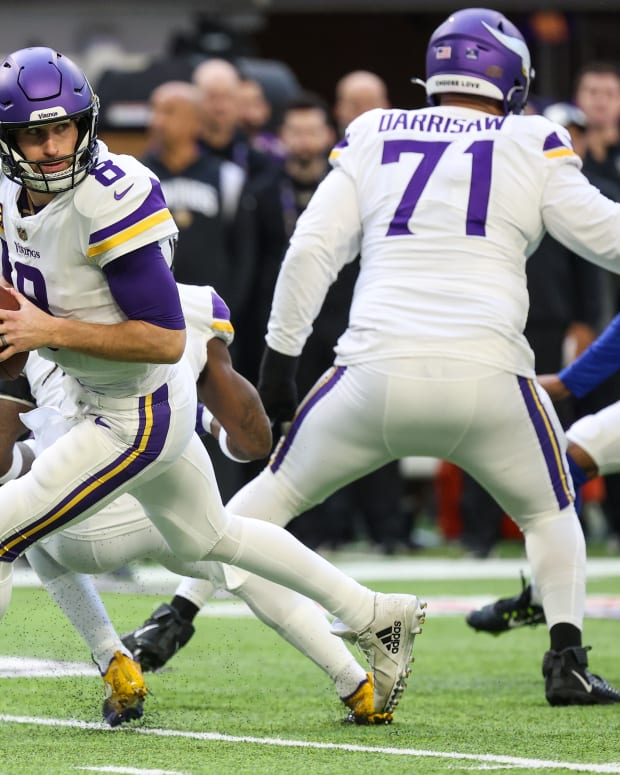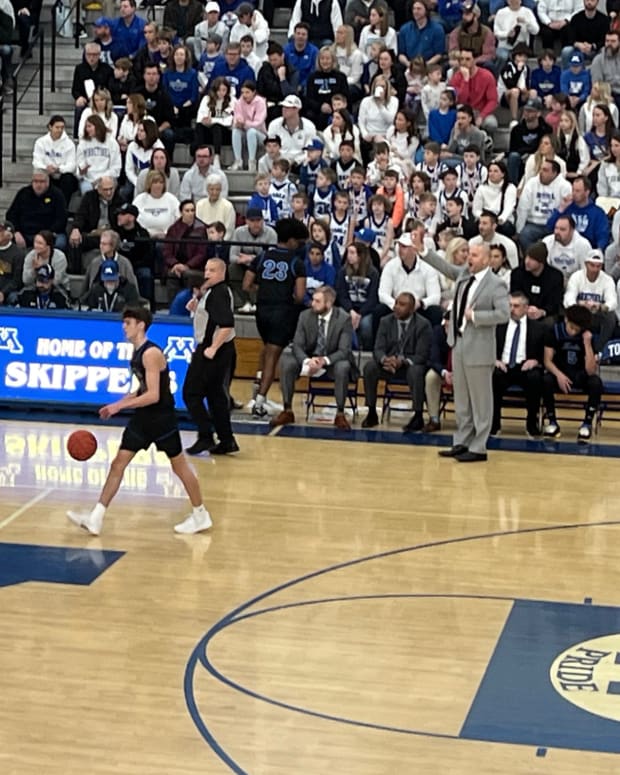Even after his best game, Kirk Cousins still wants a few throws back
EAGAN — Hey Kirk, what did you see on that touchdown pass to Jordan Addison?
You would think that a quarterback who threw a breathtaking 60-yard touchdown that directly led to a season-saving win over one of the best teams in the NFL would be happy to break down the game-changing play but Kirk Cousins wasn’t as thrilled as the thousands of fans in purple who went bat-bleep crazy after Addison stole the ball away from cornerback Charvarius Ward and ran into the end zone.
Instead, Cousins seemed annoyed with himself.
“I didn't really know where to lead him,” Cousins said. “I was like, I don't want to over-lead him and then what I did was I under-led him, so then you allow the [cornerback] to undercut it. I thought it was getting picked, and Jordan -- I still don't quite know. I haven't seen it in slow motion. I still don't know how Jordan came away with it.”
Cousins played one of his best games as a Viking against the 49ers, completing 78% of his passes for 378 yards, the 10th most in his 149-game career, against a top-five ranked defense. Even more impressively, he completed 14-of-16 passes for 220 yards while under pressure from the 49ers defense (per PFF), including the Addison touchdown in which he got the ball off against an all-out blitz just in time before the rush arrived.
Yet at TCO Performance Center on Wednesday, Cousins was still lamenting his lone turnover-worthy throw from the game.
“I hate watching plays that go our way but I felt like we were fortunate because I don’t feel we were good enough,” Cousins said. “So I watch it and say, ‘We got away with one.’ I don’t even like celebrating.”
It isn’t often that you feel like consoling a quarterback over a 60-yard touchdown pass.
Cousins went on to explain that he loses sleep over the throws he doesn’t feel good about and the yards that was left out on the field, like two red zone opportunities that came away empty handed.
“I torment myself because I look at the production and say, ‘It should be so much better,’” Cousins said.
Two questions come to mind with Cousins’ self-critical response to his overall terrific game: 1) Why has he adopted such a harsh mindset when it comes to evaluating his own play? 2) Does it help or hurt him?
The first answer begins with the concept of focusing on process over results. That phrase has been adopted by so many players, coaches and general managers that it now reads like cliche jargon but it’s a lifestyle for Cousins when he’s studying his own performance.
“We got away with one,’” Cousins said. “I don’t love living like that for too long because I don’t feel like it’s sustainable. I feel like you have to ultimately earn it.”
Cousins’ point is that if he threw the ball behind the receiver like he did on Addison’s touchdown 100 times that maybe 75 or more the ball gets intercepted. He wants to make the right throw so the receiver cruises into the end zone rather than having to make an all-world play because the right throw hits 90 times out of 100.
There is another side to that same coin. Against the Los Angeles Chargers, the final play of the game came on a perfectly accurate pass into the end zone that bounced off tight end TJ Hockenson’s hands and turned into an game-ending interception. He would make that same throw again believing that 75 out of 100 times it wins the game.
“I think like the last play of the Chargers game, where you’re like, ‘Man, everything I’m doing there – my process, my thought process, my strategy, where I’m putting the ball – I’m doing what I want to be doing there, and it just didn’t get the result we wanted,’” Cousins said. “You still go back and say, maybe, ‘How can I make it easier?’ But you’re certainly aware that the ball’s not always going to bounce your way, and it doesn’t change the fact if your process was good, you should stick with it.”
There are examples all over sports of similar lines of thinking. Basketball coaches track quality possessions rather than focusing on whether the open shots were made or missed because they believe that more open shots will result in good things in the long run. Hitters look at how often the barrel of the bat struck the ball instead of just their batting average during a given stretch.
“I think that’s part of Kirk’s process,” head coach Kevin O’Connell said. “I’ve learned about him a long time ago, always in the evaluation process of himself, he looks kind of how he could’ve done this better or that better, this play or this throw, regardless of if the play is made or not. He’s been in this league long enough to know he can only control what he can control.”
Sometimes this rigid way of thinking be frustrating for those around him. There is no better example than his checkdown on fourth-and-8 in the playoffs to Hockenson, which Cousins argued was the right decision because he was under pressure even if putting the ball up for grabs to Jefferson or Adam Thielen may have been the desired throw from fans, media and his receivers.
Which brings us to part 2: Is it good for him?
“I know Kirk is overly critical of himself, I love that about him,” O’Connell said. “I think it drives him to be better and better and his growth and our offense continues to skyrocket, and I think everybody can see that, but I thought he played a pretty darn good game the other night.”
Tim Jenkins agrees.
“Part of why Kirk has been in the league for so long and successful is because of this, right?” Jenkins said over the phone this week.
Jenkins is a former quarterback at Fort Lewis College who spent a summer in St. Louis Rams training camp in 2013. After that he started Jenkins Elite, a football training company that works with players of all levels from youth to pro. Jenkins personally works with quarterbacks, including current Browns QB PJ Walker. He also runs a YouTube channel called All Things QB in which he breaks down quarterback film.
Jenkins explained that the quarterbacks who reach the pro level and thrive as Cousins has do so by being detailed to the point of absurdity. How many people would be furious if a receiver ran 14 yards when a route is designed to go 12, Jenkins asks. Not that many but Peyton Manning or Drew Brees would be.
“Everybody remembers their high school quarterback is laid back but that’s not what you’re getting at the college level and pro level from guys that are successful — they are anything but laid back,” Jenkins said. “It’s a personality trait from these guys who last in the league, especially from the pocket, Kirk can’t live in a world where, ‘Ah, it’s OK I’ll bail myself out with my feet.’”
There’s laid back and then there’s self destructive, right? How is it better to slam yourself for a throw that went for a touchdown?
Jenkins explained how the self critique gets applied from watching the game back to implementing improvements.
“When you are re-watching your game the first thing you are watching if it’s a pure pass concept is whether you got to the right spot,” Jenkins said. “Was this the correct read. Did they fool me? Did I read the coverage wrong? And then from there you are evaluating mechanics. If it’s a good throw, move on. If it wasn’t a good throw, why? Did I have a breakdown mechanically? Was my base messed up? Was it because of a pressure and you can’t be good mechanically?”
“If my front foot is [bad] on a play then it’s something you focus on in practice. You get the QB ground camera on you and get the ground cam footage and see where the front foot is hitting.”
After years and years of analyzing the details of every coverage read and the mechanics of every throw and then going to practice and aiming to improve those things, Cousins has an unfathomable amount of hours studying and correcting.
Of course, Jenkins admits that many successful quarterbacks need to have a little “screw it” in their game. Joe Burrow famously said, “F-it, Ja’Marr is down there somewhere,” about heaving a prayer to star receiver Ja’Marr Chase. We can all imagine the likes of Favre, Rodgers, Roethlisberger and Mahomes making wild plays that are far from the textbook way to do it.
But there’s no one right way to play quarterback. Manning, Brady and Brees didn’t have much screw-it to their game and accomplished just as much as the reckless-abandon QBs.
Jenkins thinks that Cousins’ hardline approach to evaluating himself is a constant battle that he’s winning more than losing and it appears to be balanced out by O’Connell, who has an encouraging and positive disposition when it comes to handling his quarterback.
“When you are coaching those guys though you have to be the guy who stays on him like, ‘hey, I know that wasn’t our best throw but let’s move on because the outcome was OK,’” Jenkins said. “You have to identify in your quarterback what he needs. Kirk Cousins is a guy where you need to build him up because he’s going to be so hard on himself.”
Former North Carolina Central quarterback Malcolm Bell, who now drives Undefeated Quarterback Training and is the offensive coordinator at 2022 state champion Trinity Episcopal School in Virginia, has also taken notice of the O’Connell-Cousins relationship.
“You see younger coaches who understand the nurturing of the quarterback and understanding different personality traits,” Bell said. “The younger guys in the Shanahan coaching tree they have mastered how to coach any type of quarterback and it’s about meeting them halfway…It creates an environment for the quarterback to thrive in and feel comfortable in.”
When it comes to being hard on yourself, Bell tries to impart on his quarterbacks that moving on from frustrating plays is key. Cousins, for example, did not let his frustration over the poor Addison throw linger and led a scoring drive out of halftime that put the Vikings up 19-7.
“It’s really vital to find the balance between being hard on yourself when it comes to mistakes but not dwelling on them,” Bell said. “We really, really teach progress over perfection because it’s to remind guys that constant growth is the goal…You can see it when you watch [Cousins] that he’s very particular and his mind has gotten him to that spot.”
Part of the dynamic to Cousins’ perfectionism is the receivers that he plays with. Justin Jefferson and Jordan Addison are not your run-of-the-mill players. They tilt the odds of turning a mistake into a great play much farther in their QB’s favor than most.
“Receivers are more like, ‘I’m a playmaker, I don’t care if it’s two guys, give me a chance,’” Bell said. “It’s a healthy balance in the quarterback’s mind between what the play is meant to do and if I get in that situation that I have this [receiver] where he can make a play. There’s a system in place and there’s a progression but there’s a time to make a play and you want to get it to those playmakers. It’s not always about the ball being the most accurate or the tightest spiral, that doesn’t matter to the receiver because they want to make a play.”
Jefferson doesn’t just help by making catches like he did in Buffalo last year — a ball that Cousins critiqued as being too high. The Vikings’ star receiver doesn’t seem to dwell on things and lives in the moment, even when he’s not playing. After the game, he put an ESPN SportsCenter top 10 chain around Cousins’ neck. Cousins is trying to adopt at least some of that vibe.
“Justin helps with that,” Cousins said. “He's a locker mate, and he kind helps me see that there’s another approach to it, too, where you can just kind of go out there and have fun.”
Jenkins says that he sees on tape where Cousins is trusting his excellent receivers on throws that wouldn’t normally expect to go his way, even if they aren’t exactly the crazy jump balls that Burrow puts up for Chase.
Maybe the next step is forgiving himself for the times the receiver makes him look good, as Addison did on Monday night.
“It’s why sometimes you feel like this game’s a grind,” Cousins said. “Because you’re never really just going out there and shrugging your shoulders and playing careless. You’re playing with so much care that you’re always evaluating and critiquing, and that’s kind of the balance I’m trying to find – I’ll always be trying to find – how do you push yourself to be a better quarterback, which keeps you in this league and playing well, and then how do you still enjoy it and just kind of have fun and go play?”


